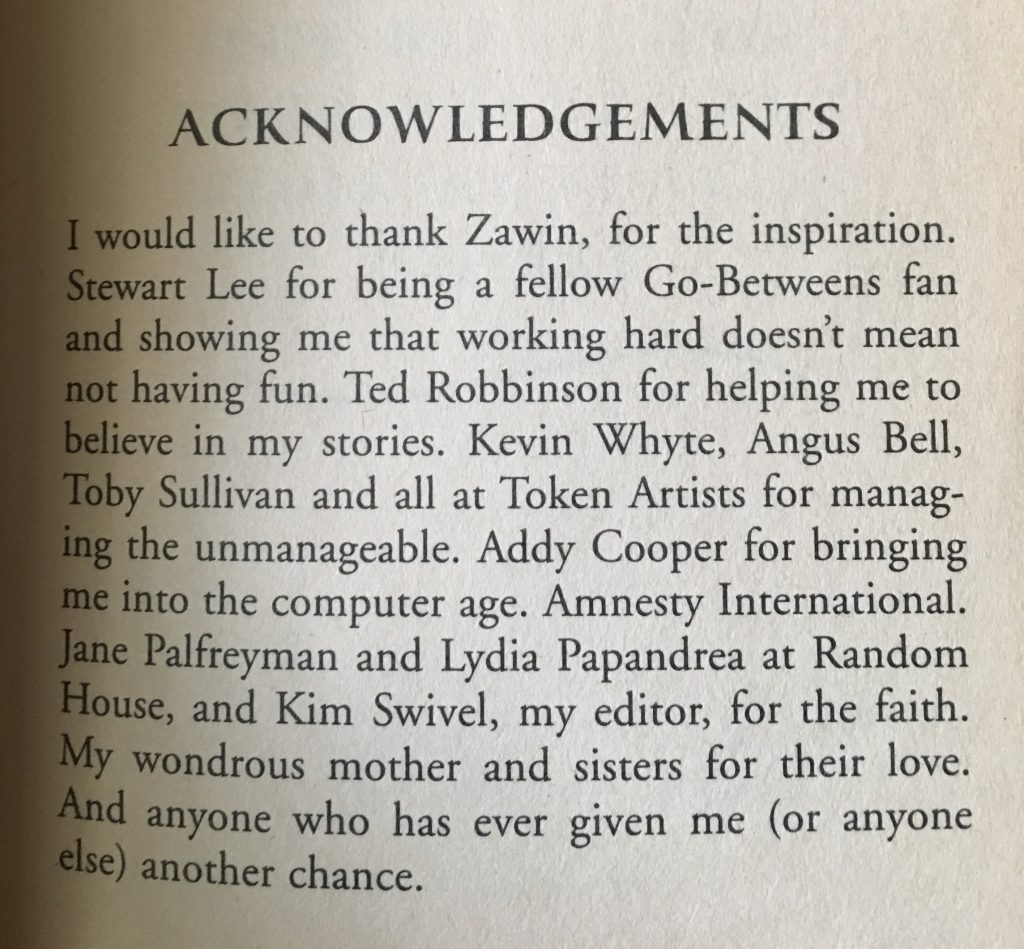Come Sail Away
So last week we saw Yours Sincerely: Bob Franklin at the Melbourne International Comedy Festival. We’re not big ones for live comedy, but we are Bob Franklin fans since way back, and word on the street suggested that this character-based comedy performance was one not to be missed for those who know a little about a well-known local comedian who shall remain namele–
The monstrous alter-ego Bob Franklin presents here is a parasitic, cynically manipulative narcissist. Of course he’s based on a comedian.
But not just a generic composite… It’s giving very little away to reveal it is based on Greg Fleet, so flimsy is the disguise of a stand-up winding up in court after stealing from his housemate to fund his heroin habit, only to clean up his act and publish his story of redemption in an image-enhancing memoir.
Okay, he’s clearly playing a character based on Greg Fleet. That really doesn’t matter: Franklin is a skilled writer and a compelling performer, and this is a very funny and completely gripping watch even if you have no idea of the subtext. That said, if you’ve read this far, well, now you know. Especially if you know literally anything at all about Greg Fleet.
But if you’re heading along to this savage, at times brutal show – which is highly unlikely, as it finished up this weekend – don’t go in expecting a lot of tell-all material from the darkest depths of the top secret Fleet files. In some ways this show could almost be just a very, very very nasty review of Fleet’s recent memoir These Things Happen, as the character Franklin is playing is very close to the picture Fleet paints of himself in his book. It’s almost as if Fleet, having come clean about his sordid past and publicly moved on, has discarded the character he once played and now Franklin has taken over the role. And decided to take him carefully and clinically apart from the inside out.
The set-up is that chummy charmer “Bob Franklin” is here before us to peddle his new book – a supposedly truthful tell-all tome that, it’s gradually revealed, he may have written largely to curry favour with the court after being charged with theft (from his housemate), and which is jam-packed with “true” stories that just happened to take place with no other witnesses around. But in between the more obvious jokes – “Bob” isn’t great at remembering names, or at seeing his daughter as much more than a prop in his tale of redemption, but he is very good at getting people to pay his bills for him – what’s gradually revealed is a man with a troubled past that doesn’t seem to have troubled him as much as it has those left in his wake.
“Bob” has a habit of recounting abusive encounters with passers-by who accurately nail his flaws, and these blunt insults (one time, after “Bob” insulted Adelaide, someone else said something like “yeah, that decaying corpse of a city will always attract maggots like you”) are often shouted out, while the rest of his seemingly amicable chat is delivered in a low voice. It’s an unsettling combination, especially as it becomes increasingly clear that there’s no bottom to this guy; he does what he likes because he’s a charming and funny man, and because that’s a combination that people will always fall for he can get away with doing what he likes.
It’s a chillingly effective performance, and it’s hard not to think the goal was (at least partly) to change the narrative around its subject. Franklin hammers home time and again that people really want to believe in tales of redemption, they want to believe that people can change – and if you’re a selfish, amoral monster that’s exactly how you get people to give you a second (or third or tenth) chance.
Here’s the acknowledgements from Fleet’s 2002 book Thai Die:
After Yours Sincerely, it’s a lot more difficult to take that last line at face value.
(especially as there was almost another decade of “second chances” to come after that was published)
While a lot of this show is clearly based on fact, there’s little point in us going through trying to fact-check it. Some details have obviously changed – he’s clearly fictionalised the details for “Bob”‘s childhood, but the broad strokes of having a father who faked his own death then turned up years later remain the same – and others are not a matter of public record. But this is much more of a psychological study than a mere recounting of events, and it’s a study that refuses to give its subject the benefit of the doubt.
So where Greg Fleet’s current standpoint is, “yeah, I did all that horrible stuff, but I’m a changed man now”, we’d say this show is about “Bob” saying “yeah, I did all that horrible stuff, but I’m a changed man now… though I would say that, wouldn’t I?”
Put another way, it’s the genius of Franklin’s show that it makes this seemingly generous tweet seem totally in-character for the character of “Bob”:
Bob Franklin is a brilliant comic, and this sounds like a brilliant show. I wish I could go. Welcome to the dark side https://t.co/iD3r38M3ae
— Greg Fleet (@thegregfleet) April 5, 2018
Because Greg Fleet would say that, wouldn’t he?


I don’t want to get all gossip columny, but did Bob write this show because Fleety stole his girlfriend? At the Dum Dum Club roast last year there were many, many jokes made on the subject.
There’s a couple of lines that might back up that reading, but it’s definitely not a theme or anything beyond the idea that everyone’s fair game to “Bob”.